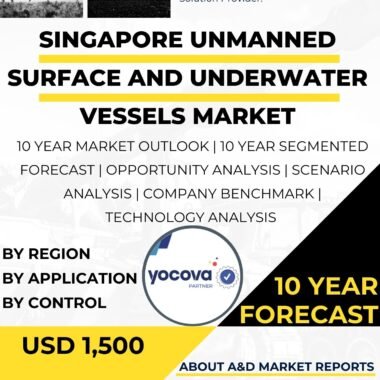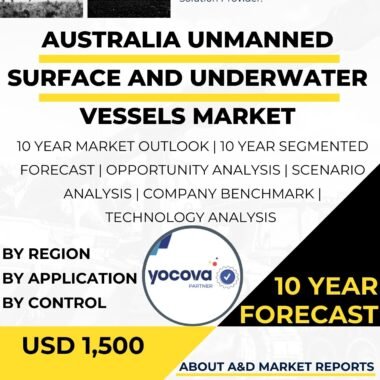Description
The Brazil Unmanned Surface and Underwater Vessels Market holds significant importance for the country’s maritime defense and security capabilities, as it seeks to adopt cutting-edge technologies to enhance its naval operations and maritime domain awareness. Unmanned Surface and Underwater Vessels are autonomous or remotely operated vehicles that operate on the surface or underwater, performing a wide range of tasks, including reconnaissance, surveillance, mine clearance, environmental monitoring, and search and rescue. As Brazil faces diverse security challenges in its extensive maritime territory and seeks to bolster its naval capabilities, the market for Unmanned Surface and Underwater Vessels has gained prominence. This article provides a comprehensive analysis of the Brazil Unmanned Surface and Underwater Vessels Market, covering its current state, key drivers, challenges, applications, technological advancements, and growth prospects.
The Brazil Unmanned Surface and Underwater Vessels Market have witnessed considerable growth due to the country’s recognition of the strategic importance of adopting unmanned technologies in its maritime operations. As a large and strategically important nation with extensive coastline and maritime resources, Brazil seeks to equip its naval forces and maritime agencies with advanced unmanned vessels to enhance its maritime surveillance and response capabilities.
One of the key drivers behind the market’s prominence is the need to improve Brazil’s maritime domain awareness. Unmanned Surface and Underwater Vessels offer a critical advantage in providing real-time data and intelligence from both surface and underwater environments, supporting maritime security and surveillance operations across the country’s territorial waters.
Moreover, the Brazil Unmanned Surface and Underwater Vessels Market is driven by the country’s ambition to achieve technological self-reliance in the defense sector. By developing and producing domestic unmanned vessels, Brazil aims to reduce dependency on foreign suppliers and foster its indigenous defense industry. This strategic approach not only enhances the country’s maritime capabilities but also boosts its defense industrial base and creates skilled jobs in the maritime and high-tech sectors.
The market’s growth is also influenced by Brazil’s interest in enhancing the safety and efficiency of its maritime operations. Unmanned Surface and Underwater Vessels can be deployed in hazardous or challenging environments without risking human lives, making them ideal for missions such as mine clearance or search and rescue operations.
The Brazil Unmanned Surface and Underwater Vessels Market finds diverse applications across various defense and civilian domains, each contributing to the country’s overall maritime capabilities. In the defense sector, unmanned vessels are crucial for maritime reconnaissance and surveillance missions. Equipped with advanced sensors and imaging systems, these unmanned platforms can gather real-time intelligence and provide situational awareness to naval commanders, enhancing their decision-making capabilities at sea.
Furthermore, unmanned vessels play a vital role in mine countermeasure operations. These autonomous or remotely operated platforms can detect, neutralize, and dispose of underwater mines, making the maritime environment safer for naval operations and commercial shipping.
Moreover, the Brazil Unmanned Surface and Underwater Vessels Market are essential for conducting environmental monitoring and research. Unmanned vessels equipped with specialized sensors can collect data on ocean currents, water quality, marine life, and climate patterns, supporting Brazil’s efforts in environmental conservation and maritime research.
Additionally, unmanned vessels are indispensable for conducting search and rescue operations at sea. Equipped with cameras and thermal imaging systems, these platforms can assist in locating and rescuing individuals in distress, supporting the country’s efforts in safeguarding lives at sea.
Besides military and security applications, unmanned vessels can also support civilian operations in various industries. In offshore oil and gas exploration, these autonomous or remotely operated platforms can be used for pipeline inspection, underwater infrastructure maintenance, and environmental monitoring, enhancing the efficiency and safety of offshore operations.
Despite the market’s growth and potential, the Brazil Unmanned Surface and Underwater Vessels Market also face certain challenges. One significant challenge is the technical complexity of developing and deploying advanced unmanned vessels. Designing autonomous or remotely operated platforms capable of navigating the dynamic maritime environment, operating for extended periods, and performing complex tasks require substantial investments in research, development, and testing.
The regulatory landscape surrounding the export and transfer of advanced maritime technologies, including unmanned vessels, also poses challenges. Compliance with international agreements and export controls while pursuing technological advancements can impact the accessibility of advanced unmanned platforms for Brazil’s defense and maritime industry.
Moreover, addressing the issue of communication and coordination between unmanned vessels and naval assets is crucial for effective maritime operations. Ensuring seamless integration and cooperation between unmanned platforms and naval vessels is essential to maximize their utility and effectiveness in various maritime missions.
Looking ahead, the Brazil Unmanned Surface and Underwater Vessels Market is expected to witness continued growth and advancements. As the country faces evolving security challenges and seeks to enhance its maritime defense and security capabilities, the demand for unmanned vessels will remain strong. Continued investment in research and development, technology transfer agreements with international partners, and collaboration between the government and private sector will drive advancements in unmanned vessel technology and applications.
In conclusion, the Brazil Unmanned Surface and Underwater Vessels Market plays a pivotal role in the country’s efforts to enhance its maritime defense capabilities and maritime domain awareness. Unmanned Surface and Underwater Vessels provide critical advantages in maritime reconnaissance, mine clearance, search and rescue, and environmental monitoring, ensuring that Brazil’s naval forces and maritime agencies have the necessary tools and support to respond effectively to various maritime missions and security challenges. The market’s growth is driven by Brazil’s commitment to achieving technological self-reliance, bolstering its maritime capabilities, and fostering innovation in the maritime and high-tech sectors. Addressing challenges related to technical complexity, regulation, communication, and international cooperation will be key to unlocking the full potential of unmanned vessels in strengthening Brazil’s maritime capabilities and contributing to various civilian applications in offshore industries and environmental conservation.




